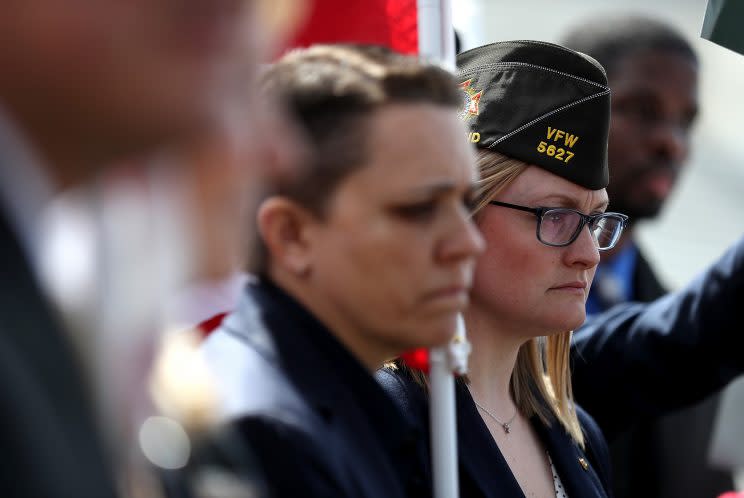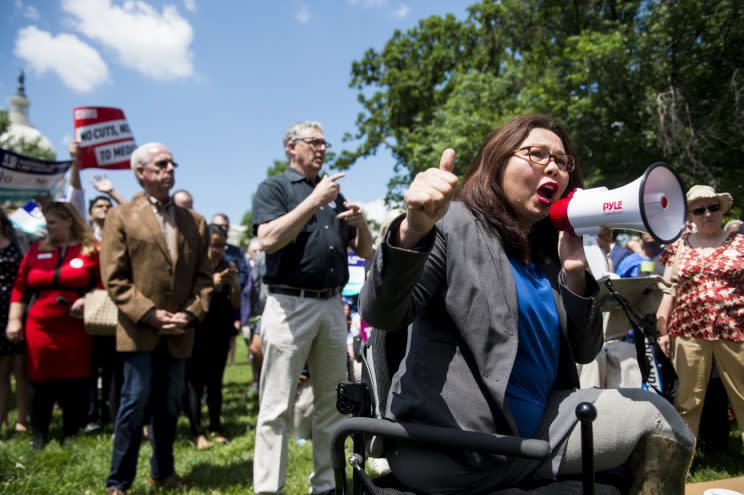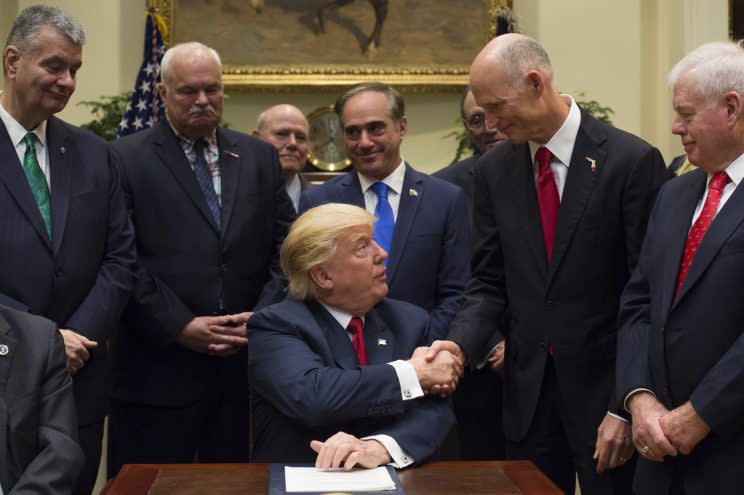Veterans need Medicaid too — and are speaking out against GOP health care bill

For Kelly Gregory, serving in the U.S. military has been a long-standing family tradition.
“We fought in every war this country’s ever engaged in,” said Gregory, an Air Force veteran who served in the first Iraq war.
Now, 25 years after retiring from the military, Gregory is fighting for her country in a different way.
“I want to be the last American that dies because I didn’t have access to health care,” said Gregory. “That’s my goal.”
Gregory, 48, has stage IV breast cancer. And she’s one of nearly 2 million veterans who risk losing access to Medicaid under the Republican health care bill currently stalled in the Senate.
“A lot of people are under the assumption that everyone who’s ever served in the military is covered by the [U.S. Department of Veteran’s Affairs] and that the VA is a 360 health service [provider],” Gregory said. “Neither of those things are true.”

In fact, as of December 2015, only about 40 percent of the nearly 22 million veterans living in the U.S. were enrolled in the Department of Veterans Affairs health care system. Not all veterans qualify for health care benefits through the VA — anyone who was dishonorably discharged or served for less than 24 consecutive months is out. But even among those who are eligible, many either do not live near a VA hospital or find that the VA does not treat their particular condition.
In Gregory’s case, the length of her Air Force service ended just six weeks short of the required 24 months.
Thanks to Medicaid, which she was able to enroll in only after receiving her dire cancer diagnosis in the spring of 2011, Gregory has been under the care of top oncologists and surgeons in Nashville.
Within the first few weeks of her diagnosis, Gregory’s doctors discovered that her cancer had metastasized to her spine, making it stage IV, or “end stage.” She was given six months to a year to live.
Exactly six years, nine surgeries, six months of chemotherapy, and 30 radiation treatments later, she’s still alive.

“Medicaid absolutely saved my life,” she said.
That’s why Gregory is determined to pressure her representatives in Congress to push back against the Senate health care legislation, which the Congressional Budget Office predicts will cause 15 million people to lose Medicaid coverage by 2026.
Approximately 1.75 million veterans rely on Medicaid for health care coverage — and that doesn’t include military spouses, children or other family members. A report by the Urban Institute found that veterans were among the demographic that saw the greatest increases in insurance coverage, thanks to the Affordable Care Act — including 340,000 veterans who are now covered under the law’s Medicaid expansion.
Related slideshow: Protesters across the country oppose GOP’s health care plan >>>
According to one estimate, by the progressive nonprofit Center for American Progress, 459,500 veterans would lose Medicaid coverage by 2026 under Senate Republicans’ proposed plan.
Following the unveiling of the bill last week, Gregory joined fellow Tennessee vets for a press conference outside the VA hospital in Nashville, where they called on other former service members from across the state to do the same. This week, Gregory met with staffers for Tennessee’s Republican senators, Bob Corker and Lamar Alexander, at their field offices in Nashville.
“I will shame whoever I have to shame,” she said. “This is a DEFCON 1 situation. If they pass this bill the way it’s written right now … it will devastate Medicaid as we know it.”
Will Fischer, a former United States Marine and Iraq war veteran, is also employing the shame tactic — but on a national scale.
“Trumpcare is an antiveteran bill,” said Fischer, who now serves as director of government outreach for VoteVets, a progressive veterans advocacy organization. “If Trumpcare passes, veterans will die. That’s a simple fact.”

In May, VoteVets teamed up with Families USA, a nonpartisan consumer health advocacy group, to produce a detailed report on the state-by-state impact of deep Medicaid funding cuts to veterans and their families.
The report, Fischer said, was distributed to “every congressional office on House and Senate side to make sure they were aware of how this affects veterans.”
Since then, Fischer has been taking to Capitol Hill to impress upon lawmakers the consequences they themselves may face by supporting such drastic cuts.
“We’ve made it very clear that we’re paying close attention to how people vote,” Fischer said, explaining that VoteVets is prepared to run attack ads and launch canvassing campaigns against any senator who votes “to gut Medicaid and to rip health care from veterans.”
“That senator’s not going to be able to go anywhere in their state … without their constituents having the knowledge that there’s a senator who thought it would be a good idea to punish veterans with Trumpcare,” he said.

Democratic Senator and Iraq War veteran Tammy Duckworth, of Illinois, hopes the potential consequences for veterans will convince her Republican colleagues to reconsider the proposed Medicaid cuts in their current bill.
“The bill is devastating for veterans,” said Duckworth, who lost both her legs in combat. “I would hope Republican senators, especially those with large military posts in their states [like] Texas, North Carolina, Alabama, Georgia … care as much about their veterans as they say they do and will take that into account when deciding whether to vote for legislation that could [take coverage away from] one in 10 veterans.”
Gregory described her meetings at Corker and Alexander’s field offices as “productive” and “positive.”
Both Corker and Alexander praised the decision, after it was announced, to delay a vote on the health care bill. Neither of them responded to requests for comment on this story, nor did Republican senators John McCain of Arizona, himself a veteran, nor Dean Heller of Nevada and Jerry Moran of Kansas, who both serve on the Senate Veterans Affairs committee.
The White House also did not respond to a request for comment on the bill’s possible ramifications for veterans. But neither Duckworth nor Fischer are optimistic that the fallout for veterans will influence the president’s position on the health care bill —despite his many promises to improve veterans’ health care.

“I would hope that the president thinks twice about supporting Trumpcare, this bill, that would hurt so many veterans,” said Duckworth. However, she continued, “He’s already shown that he’s willing to break promises all across the board.”
“Point blank, when it comes to veterans issues, Donald Trump is a liar and a charlatan,” said Fischer, suggesting that the president only “likes veterans when he’s able to use one as a prop on a stage.”
“He’s as absent for us now as he was for us in Vietnam,” Fischer said, referring to Trump’s draft deferments.
Related slideshow: ‘Die-in’ protesters dragged away from McConnell’s office >>>
Gregory also said she considered it more worthwhile to focus her energy on lobbying members of Congress and state officials than to appeal to the president.
“It doesn’t matter why you joined, once [you’re] a member of military, what you’ve done is say you’re willing to put your physical body between mortal danger and your country,” she said. “That is a level of service and sacrifice that I don’t think that man understands.”
Still, she can’t help but feel disillusioned by the fact that so many Republicans in Congress are willing to support a bill that could harm millions of veterans and their families.
“What’s deeply frustrating for me that this same group of people, when they get ready to fight a war, they know exactly where to find people like me, like my family,” she said. “They love us when we’re marching off to war but when I need help, they want to talk about me like I’m less than human.”
Read more from Yahoo News:



